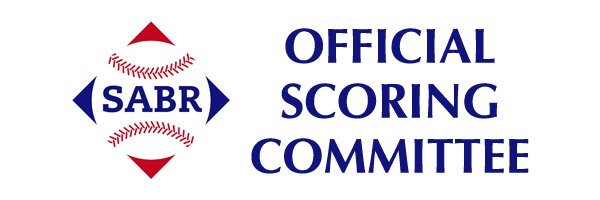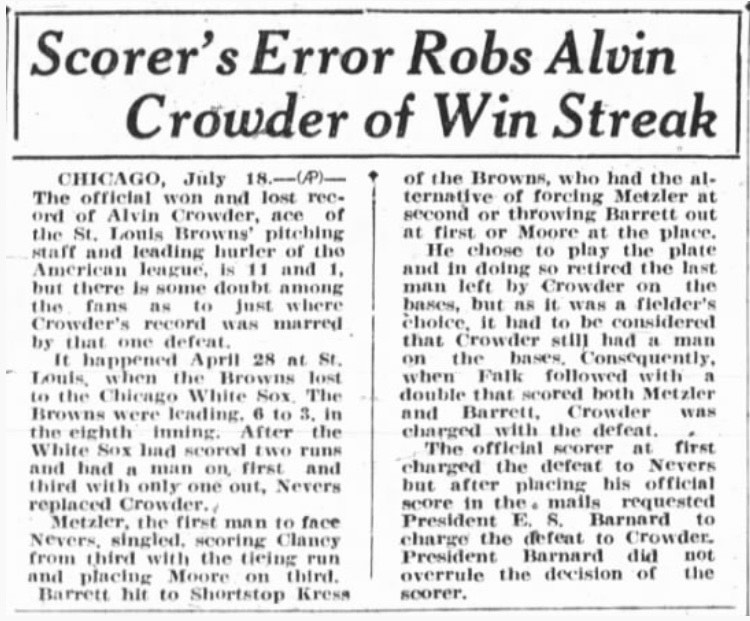SABR Official Scoring Committee: April 2021 newsletter

“You Called That a What . . . ?”
The Newsletter of the Official Scoring Committee
Society for American Baseball Research (SABR)
April 2021, Volume 6, Number 2
Editor:
Stew Thornley
- From One of the Co-Chairs
- Official Scorers in Baseball-Reference.com and Retrosheet
- Conundrums of the Month (or Quarter or Whatever)
- Profile: Max Utsler
- Bloops and Bobbles
- Conundrum Answer
- Honchos
From One of the Co-Chairs
Hi folks! Doggone. For the second year in a row, we won’t have an in-person committee meeting although we plan to be back in action and in person in Baltimore in 2022 and hope that Baltimore official scorer Dennis Hetrick will still be able to join us.
Bigger doggone. We’ve lost two official scorers. Mike Shalin of Boston and Dan Marowski of Detroit died during the off-season. That’s always tough for the community of official scorers.
For this newsletter, we do have an interview and profile of Max Utsler of Kansas City, one of the most interesting people who does official scoring. Keep scrolling to find it and be enlightened.
SABR stalwart Bill Nowlin is overseeing a book, One Win Wonders, about pitchers who won one game in the majors. Bill is seeking any committee members who are interested in writing relevant topics related to scoring, such as the differing rules and practices for awarding pitching victories over time. Anyone interested may contact Bill at bnowlin@rounder.com.
Beyond that, test yourself with our regular conundrum and keep reading for other interesting tidbits.
Official Scorers in Baseball-Reference.com and Retrosheet
Baseball-Reference.com is now recognizing official scorers with their own pages such as this one:
As you can see, it has no information beyond his name, but the pages will be filled in with more, such as the scorer’s full name, date and place of birth, and additional information in the B-R Bullpen.
Retrosheet includes the name of the official scorer in the box scores for all games going back to about 2004. Each scorer will also have a Retrosheet page.
This is a great step forward for official scorers to be recognized in this way.
Conundrum of the Month (or Quarter or Whatever)
A player who is normally a third baseman is playing left field and muffs a fly ball. In determining whether to charge the player with an error, can the official scorer take into account that the player was not playing his normal position?
Profile: Max Utsler
Max Utsler is an official scorer for Major League Baseball for the Kansas City Royals. His path to official scoring started when he got his first teaching job, seventh-grade English, at a junior high school in a suburb of Minneapolis. He also became a volunteer assistant for the Minnesota Gophers under Dick Siebert and Jerry Kindall, who taught him how to create a detailed scorebook. “They wanted to be able to recreate a game in such a way to give credit to players who made great plays. For example, they kept a separate batting average for ‘wells, ’ well hit balls whether a base hit or out. ”
Max continued as a volunteer assistant coach when he went to graduate school at the University of Missouri and also started a career in journalism that often took him to the ballparks in Kansas City and St. Louis, where he occasional covered games with television jobs he had. He eventually settled in at the University of Kansas and began free-lancing for mlb.com and met Mike Swanson, the Royals’ public-relations director. “About a year later Swanee asked me if I would be interested in being an official scorer. I said sure. He soon told me I was in the queue. For the next two years I asked where I stood, and he always said, ‘You’re in the queue.’ Two years after that I had the job. Guess it was a long queue.”
What interesting situations have you encountered while scoring?
I have also scored for seven years in the independent league, the American Association for the Kansas City T-Bones. I love it because almost every game I get a new, and often weird play. It has made me better acquainted with the rule book. One night the T-Bones were playing the Lincoln Salt Dogs (love those AA names). Two outs, runners on 1st and 2nd for the Salt Dogs #3 hitter. He hits a line shot into the corner and clears the bases. I seem some scrambling on the infield. The pitcher gets the ball, toes the rubber, steps off and throws to the 2B indicating the runner from first has missed the bag. Base ump signals out. HP ump points to home and waves off the runs. No surprises there. I knew to give the putout to the 2B and thought I should give an assist to the pitcher. I gave the batter a double but obviously not RBIs. I went to the scorebook the next inning and saw the pitcher assist was correct. But as I read another second in the rule book, I became concerned. Maybe I should have given the hitter a single. So I called Elias. I was humbled (and embarrassed) to find both the double and single calls were wrong. Turns out the Dogs’ #3 hitter had just hit into a 360-foot force out. By missing the bag, the runner from 1st never secured second. Thus, a force out. A quick postscript. I called the T-Bones Media Relations Director, told him what happened and asked him what we should do. We discussed calling the league office. We also discussed the only downside was the #3 hitter lead the AA in doubles. We didn’t call the league office. I have rationalized this by saying I did the right thing after I had done the wrong thing. I promise you that could NEVER happen in MLB.
What advice do you have for people interested in official scoring?
Practice, practice, practice. Go to games at every level. Score along on TV. You will find you watch baseball in a much more intense way when you are scoring. See if you can volunteer to work your local high school or college games. Once you have that part down, start developing a thicker skin. Be firm and timely in making your calls. Still, you may make the correct call and have a majority of the fans disagreeing. Don’t take it personally. When you are wrong, admit you are wrong and try to correct it.
Bloops and Bobbles
While researching Ernie Nevers, Anthony Bush saw that in contemporary accounts he had one win and one loss for the Browns in 1928 before his contract was sold to Mission in May. This was different than the 1-0 record that is in the official records. He wondered about the discrepancy and finally found the answer in an article from July of 1928:

Another discrepancy that has lingered for more than a century has now been cleared up. Who threw the first no-hitter in the history of the American League?
He Got His No-Hitter, 119 years after Throwing It
On the subject of no-hitters, what are the chances of a no-hitter taken into the ninth being completed as a no-hitter? During the expansion era, the answer has remained consistently close to 50 percent. Here is a list of games in which a no-hitter was broken up in the ninth inning.
Lost in the Ninth: No-Hitters Broken Up in the Ninth Inning Since 1961
Here is a partial list of no-hitters broken up in the ninth prior to 1961:
Lost in the Ninth: No-Hitters Broken Up in the Ninth Inning 1871-1960
Tim Wiles, the former director of research for the Baseball Hall of Fame, has written about the first woman official scorer:
Eliza Green Became the First Female Official Scorer in 1882
Two other women—Susan Fornoff with Oakland and San Francisco in the 1990s and Marie-Claude Pelland-Marcotte with Toronto in the 21st Century—have been regular-season official scorers in the major leagues.
Conundrum Answer
No. Ordinary effort, in the section on definitions of terms, is “the effort that a fielder of average skill at a position in that league or classification or leagues should exhibit on a play, with due consideration given to the condition of the field and weather conditions.”
The comment for ordinary effort defines this as “an objective standard in regard to any particular fielder. In other words, even if a fielder makes his best effort, if that effort falls short of what an average fielder at that position in that league would have made in a situation, the official scorer should charge that fielder with an error.”
Honchos
Chris Phillips—(Co-Chair)
Stew Thornley—(Co-Chair and Newsletter Editor)
Marlene Vogelsang—(Vice Chair)
Gabriel Schechter—(Vice Chair)
Bill Nowlin—(Vice Chair)
Sarah Johnson—(Vice Chair)
John McMurray—(Vice Chair and Liaison to the Oral History Research Committee)
Art Mugalian—(Assistant to the Traveling Secretary)


